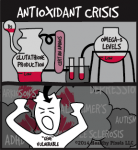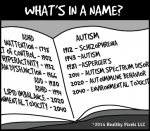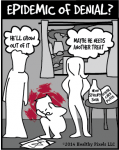The material appearing on HealthyPixels.com is for educational use only. It should not be used as a substitute for professional medical advice, diagnosis or treatment. Healthy Pixels LLC does not endorse and expressly disclaims liability for any product, service, manufacturer mentioned or advertised on this web site.
By Shari Cheves on March 26th, 2014% 
The antioxidant-starved brain
Feeling a little brain fog? Anxiety? Depression? Imbalances and deficiencies in the brain can mess with our thoughts just as they manifest neurological conditions like autism, ADHD, Parkinson’s disease, and Alzheimer’s disease. When we step back and listen for clues, we can hear our cognitive health screaming for attention, namely in . . . → Read More: Autism & ADHD part 4: Food for thought
By Shari Cheves on March 9th, 2014% 
Testing for autism – a dangerous waiting game
Currently, autism can only be diagnosed through careful observation by professional health experts, and we are lacking doctors with experience and training for early screening. At-risk infants and toddlers may be identified early, but most wait many months or years before official diagnosis and treatment . . . → Read More: Autism & ADHD part 3: Testing and diagnosis
By Shari Cheves on March 1st, 2014% 
The CDC reports that up to 1 in 5 children have a mental disorder. While autism is the fastest growing type, ADHD is the most common. According to studies, both autism and attention deficit hyperactivity disorder often involve similar environmental toxins, nutritional deficiencies and therapies. A child’s problems can range from stuttering to social . . . → Read More: Autism & ADHD part 2: Proposed prenatal prevention
By Shari Cheves on December 7th, 2013% 
Highlights
• Autism appears to be a condition that stems from early developmental disturbances in the womb
• Symptoms may be aggravated by exposure to inflammatory substances that are not well tolerated by these individuals
• Autism (ASD) and ADHD (attention-deficit/hyperactivity disorder) tend to co-occur in families and within individuals
• Genetics, exposure to . . . → Read More: Autism & ADHD part 1: Damage to precious cargo
|
